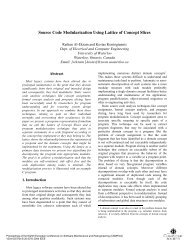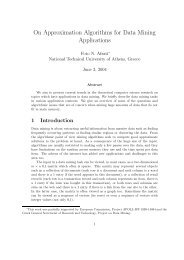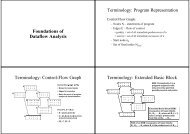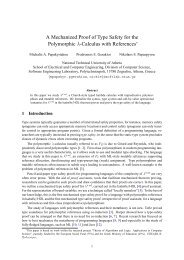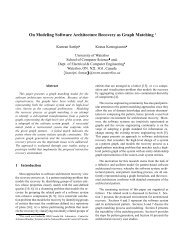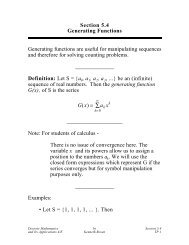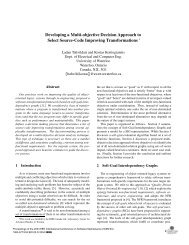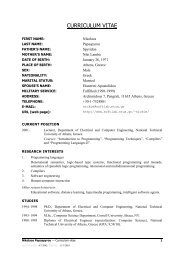Manual
Manual
Manual
You also want an ePaper? Increase the reach of your titles
YUMPU automatically turns print PDFs into web optimized ePapers that Google loves.
Chapter 9: Invoking Bison 97<br />
9 Invoking Bison<br />
The usual way to invoke Bison is as follows:<br />
bison infile<br />
Here infile is the grammar file name, which usually ends in ‘.y’. The parser file’s name<br />
is made by replacing the ‘.y’ with ‘.tab.c’ and removing any leading directory. Thus, the<br />
‘bison foo.y’ file name yields ‘foo.tab.c’, and the ‘bison hack/foo.y’ file name yields<br />
‘foo.tab.c’. It’s also possible, in case you are writing C++ code instead of C in your grammar<br />
file, to name it ‘foo.ypp’ or ‘foo.y++’. Then, the output files will take an extension<br />
like the given one as input (respectively ‘foo.tab.cpp’ and ‘foo.tab.c++’). This feature<br />
takes effect with all options that manipulate file names like ‘-o’ or ‘-d’.<br />
For example :<br />
bison -d infile.yxx<br />
will produce ‘infile.tab.cxx’ and ‘infile.tab.hxx’, and<br />
bison -d -o output.c++ infile.y<br />
will produce ‘output.c++’ and ‘outfile.h++’.<br />
For compatibility with POSIX, the standard Bison distribution also contains a shell script<br />
called yacc that invokes Bison with the ‘-y’ option.<br />
9.1 Bison Options<br />
Bison supports both traditional single-letter options and mnemonic long option names.<br />
Long option names are indicated with ‘--’ instead of ‘-’. Abbreviations for option names<br />
are allowed as long as they are unique. When a long option takes an argument, like<br />
‘--file-prefix’, connect the option name and the argument with ‘=’.<br />
Here is a list of options that can be used with Bison, alphabetized by short option. It is<br />
followed by a cross key alphabetized by long option.<br />
Operations modes:<br />
‘-h’<br />
‘--help’<br />
Print a summary of the command-line options to Bison and exit.<br />
‘-V’<br />
‘--version’<br />
Print the version number of Bison and exit.<br />
‘--print-localedir’<br />
Print the name of the directory containing locale-dependent data.<br />
‘-y’<br />
‘--yacc’<br />
Act more like the traditional Yacc command. This can cause different diagnostics<br />
to be generated, and may change behavior in other minor ways. Most<br />
importantly, imitate Yacc’s output file name conventions, so that the parser<br />
output file is called ‘y.tab.c’, and the other outputs are called ‘y.output’ and<br />
‘y.tab.h’. Thus, the following shell script can substitute for Yacc, and the<br />
Bison distribution contains such a script for compatibility with POSIX:



